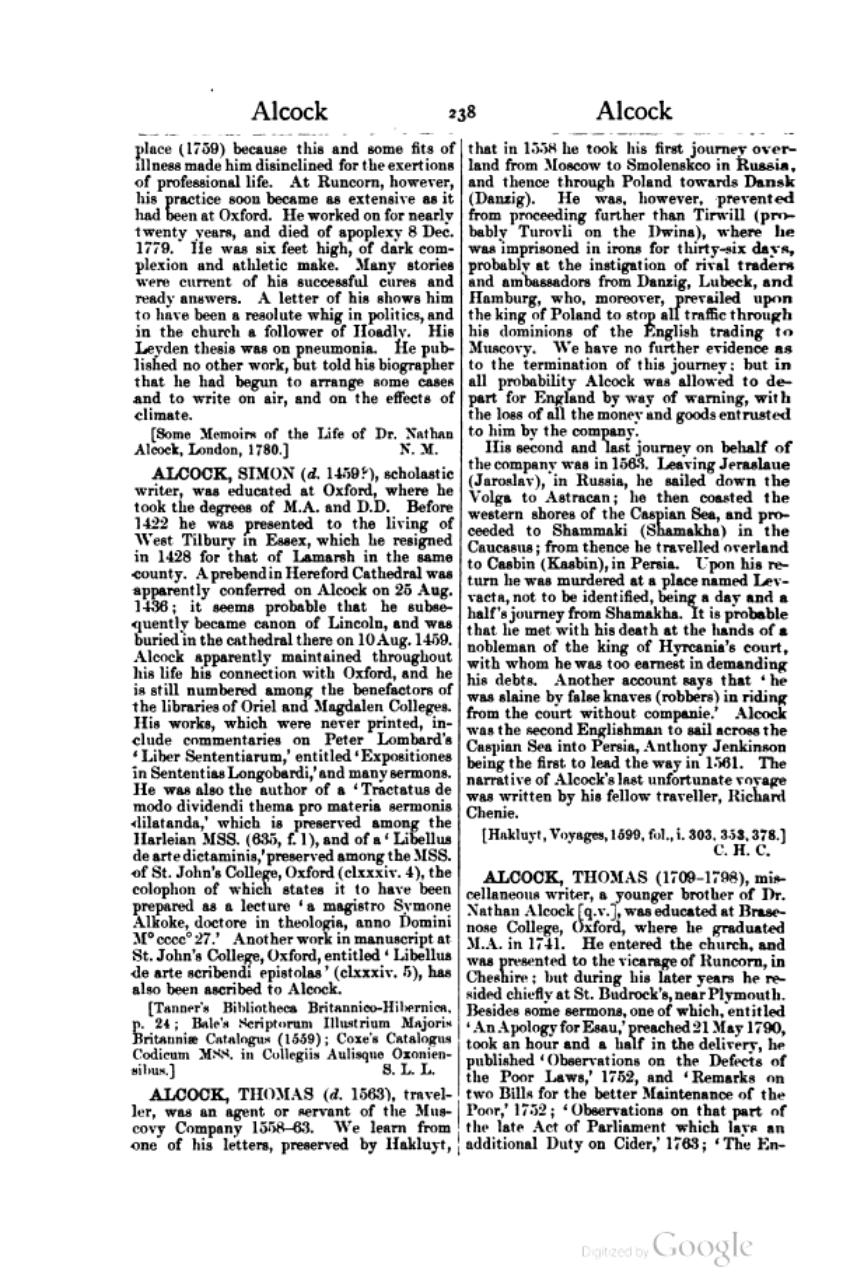place (1759) because this and some fits of illness made him disinclined for the exertions of professional life. At Runcorn, however, his practice soon became as extensive as it had been at Oxford. He worked on for nearly twenty years, and died of apoplexy 8 Dec. 1779. He was six feet high, of dark complexion and athletic make. Many stories were current of his successful cures and ready answers. A letter of his shows him to have been a resolute whig in politics, and in the church a follower of Hoadly. His Leyden thesis was on pneumonia. He published no other work, but told his biographer that he had begun to arrange some cases and to write on air, and on the effects of climate.
[Some Memoirs of the Life of Dr. Nathan Alcock, London, 1780.]
ALCOCK, SIMON (d. 1459?), scholastic writer, was educated at Oxford, where he took the degrees of M.A. and D.D. Before 1422 he was presented to the living of West Tilbury in Essex, which he resigned in 1428 for that of Lamarsh in the same county. A prebend in Hereford Cathedral was apparently conferred on Alcock on 25 Aug. 1436; it seems probable that he subsequently became canon of Lincoln, and was buried in the cathedral there on 10 Aug. 1459. Alcock apparently maintained throughout his life his connection with Oxford, and he is still numbered among the benefactors of the libraries of Oriel and Magdalen Colleges. His works, which were never printed, include commentaries on Peter Lombard's ‘Liber Sententiarum,' entitled ‘Expositiones in Sententias Longobardi,' and many sermons. He was also the author of a ‘Tractatus de modo dividendi thema pro materia sermonis dilatanda,' which is preserved among the Harleian MSS. (635, f. 1), and of a ‘Libellus de arte dictaminis,' preserved among the MSS. of St. John's College, Oxford (clxxxiv. 4), the colophon of which states it to have been prepared as a lecture ‘a magistro Symone Alkoke, doctore in theologia, anno Domini Mo cccco 27.' Another work in manuscript at St. John's College, Oxford, entitled ‘Libellus de arte scribendi epistolas' (clxxxiv. 5), has also been ascribed to Alcock.
[Tanner's Bibliotheca Britannico-Hibernica, p. 24; Bale's Scriptorum Illustrium Majoris Britanniæ Catalogus (1559); Coxe's Catalogus Codicum MSS. in Collegiis Aulisque Oxoniensibus.]
ALCOCK, THOMAS (d. 1563), traveller, was an agent or servant of the Muscovy Company 1558–63. We learn from one of his letters, preserved by Hakluyt, that in 1558 he took his first journey overland from Moscow to Smolenskco in Russia, and thence through Poland towards Dansk (Danzig). He was, however, prevented from proceeding further than Tirwill (probably Turovli on the Dwina), where he was imprisoned in irons for thirty-six days, probably at the instigation of rival traders and ambassadors from Danzig, Lubeck, and Hamburg, who, moreover, prevailed upon the king of Poland to stop all traffic through his dominions of the English trading to Muscovy. We have no further evidence as to the termination of this journey; but in all probability Alcock was allowed to depart for England by way of warning, with the loss of all the money and goods entrusted to him by the company.
His second and last journey on behalf of the company was in 1563. Leaving Jeraslaue (Jaroslav), in Russia, he sailed down the Volga to Astracan; he then coasted the western shores of the Caspian Sea, and proceeded to Shammaki (Shamakha) in the Caucasus; from thence he travelled overland to Casbin (Kasbin), in Persia. Upon his return he was murdered at a place named Levvacta, not to be identified, being a day and a half's journey from Shamakha. It is probable that he met his death at the hands of a nobleman of the king of Hyrcania's court, with whom he was too earnest in demanding his debts. Another account says that ‘he was slaine by false knaves (robbers) in riding from the court without companie.' Alcock was the second Englishman to sail across the Caspian Sea into Persia, Anthony Jenkinson being the first to lead the way in 1561. The narrative of Alcock's last unfortunate voyage was written by his fellow traveller, Richard Chenie.
[Hakluyt, Voyages, 1599, fol., i. 303, 353, 378.]
ALCOCK, THOMAS (1709–1798), miscellaneous writer, a younger brother of Dr. Nathan Alcock [q.v.], was educated at Brasenose College, Oxford, where he graduated M.A. in 1741. He entered the church, and was presented to the vicarage of Runcorn, in Cheshire; but during his later years he resided chiefly at St. Budrock's, near Plymouth. Besides some sermons, one of which, entitled ‘An Apology for Esau,' preached 21 May 1790, took an hour and a half in the delivery, he published ‘Observations on the Defects of the Poor Laws,' 1752, and ‘Remarks on two Bills for the better Maintenance of the Poor,' 1752; ‘Observations on that part of the late Act of Parliament which lays an additional Duty on Cider,' 1763; ‘The En-
